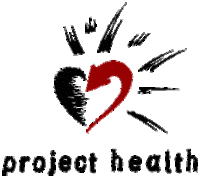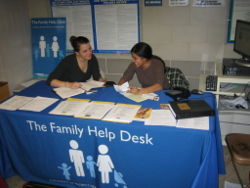Project Health
| Project HEALTH | |
| [[Image:|120px]] | |
| Founded: | 1999 |
| Recognition: | Community Impact |
| Membership: | ~60 |
| Executive Board: | 2 Campus Coordinators; 2-4 Program Coordinators/program |
| Category: | {{{Category}}} |
| Website: | http://www.projecthealth.org |
| Contact: | {{{Contact}}} |
Project Health (PH) is the Columbia site of a national nonprofit, Project HEALTH [1], that has locations at universities in Boston (Harvard, BU), Providence (Brown), Washington DC (GW), Baltimore (Johns Hopkins, UMBC, Loyola), New York (Columbia, NYU), and Chicago (UChicago).
Project Health at Columbia is an organization affiliated with Community Impact; it mobilizes approximately 60 volunteers per semester to "break the link between poverty and poor health" through its Family Help Desk and STRIVE programs. The organization is almost entirely student-run, with some support from full-time staff in New York and national staff in Boston.
History and Programs
Project Health at Columbia was founded in 1999. Project Health historically ran one help desk and five youth programs--HCRC/FHD, UJIMA, STRIVE, FitNut, Asthma Swim, and TIDES. Starting in spring 2008, Project Health restructured to focus on the Family Help Desk programs and STRIVE youth program.
The Family Help Desk at Harlem Hospital
The Harlem Community Resource Center (HCRC), was the first program created at Columbia in 1999 and is the flagship program of the Project Health model. In 2007, the HCRC was renamed the Family Help Desk at Harlem Hospital to match the titles of sister programs at other sites. FHD volunteers recognize that the health of families is not only linked to access to medicine, but also social and economic barriers. Nutrition, employment, childcare, education, housing conditions, etc. all affect the income and health of families--a child with asthma cannot stay healthy even with medication if he/she does not have proper meals because his/her parents are unemployed and they live in an apartment with mold and peeling paint.
The FHD operates in the pediatrics clinic in the Ron Brown Pavilion of Harlem Hospital on 135th and Lenox. After distributing flyers and explaining the function of the desk to patients in the clinic waiting room, patients approach the desk and volunteer fill out an intake form to gather personal information, contact information, family composition, and the psychosocial needs of the patient. After completing the intake form, the volunteer will connect or give referrals to the client for resources including, but not limited to: food stamps, food pantries, school meals, childcare, afterschool care, summer camps, GED/ESL classes, legal assistance, cash assistance and public benefits, healthcare, job training, job placement, housing advocacy, and housing search. This information is communicated to the patient on-site, and through extensive follow-up phone calls until the patient's needs are met. Additionally, FHD volunteers also receive referrals from clinic physicians, nurses, social workers, and even outside community organizations.
The Family Help Desk at Columbia-Presbyterian
FHD Presbyterian was founded in 2008 at the Washington Heights Family Health Center affiliated with NY-Presbyterian Hospital on 181st and St. Nicholas, and first shifts began in 2009. It has the same program model as all FHD programs of connecting patients to socioeconomic resources in order to improve patient health.
Volunteers will flyer both the pediatrics and adult clinics in the Health Center to attract cases, as well as receiving referrals from physicians and social workers. Volunteers cover a similar range of issues, but urgent cases involving housing, domestic violence, food stamps, legal assistance, etc. are referred to or worked on in collaboration with social workers.

